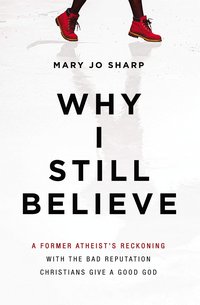 |
Why I Still Believe:
|

What’s Why I Still Believe About?
For the sake of time, let me lift this from Sharp’s website:
With fresh and thoughtful insights, Why I Still Believe offers a spiritual narrative that presents relevant answers to haunting questions like:
- Isn’t there too much pain and suffering to believe?
- Is it okay to have doubt?
- What if Jesus’ story is a copy of another story?
- Is there any evidence for Jesus’ resurrection?
- Does atheism explain the human experience better than Christianity can?
- How can the truth of Christianity matter when the behaviors of Christians are reprehensible?
At once logical and loving, Sharp reframes the gospel as it truly is: the good news of redemption. With firmly grounded truths, Why I Still Believe is an affirming reminder that the hypocrisy of Christians can never negate the transforming grace and truth of Christ.
Sharp presents herself—warts and all—and her struggle with doubts, and some of what she’s found to address them. I want to stress what the description says about “a spiritual narrative”—that’s what this book is, and along the way, that narrative will touch on those bullet points. I’m not sure what the claim about “reframing the gospel” is about—how does it need “reframing” to be “the good news of redemption”? And as important as a reminder along those lines would be, this is more of an assertion about the hypocrisy of believers being unable to negate anything than it is a reminder (or defense of the faith for it).
Ultimately, I think this is a story about a woman being let down by the shepherds of Christ’s Church—she needed help, she needed guidance, she needed pastoral care and aid in finding the answers that she needed. In the absence of that shepherding, she had to help herself.
So, what did I think about Why I Still Believe?
The chapters that follow are snapshots of my experience in the church and how those experiences shaped me and my beliefs. If you feel the ever-present tension of the beauty of salvation alongside the ugliness of human hypocrisy and evil, you’re not alone. If you are uncomfortable in the church but feel the risk of commitment calling, this book is for you. It is for those who’ve wondered if they’ve been left a cosmic orphan, and wondered again if there’s more to this unshakeable longing to belong. I can’t promise any tidy endings, but there’s still an irresistible Hope.
I’m not going to talk about all the problems I have with what Sharp presented, but there were many. The above quotation is the concluding sentences of the Introduction. Set against those goals, I think she succeeds—she shows that the reader who matches those qualifications isn’t alone, she doesn’t deliver any tidy endings (and the tidy things she does present aren’t really that tidy), and she does assert that there’s an irresistible Hope. What she doesn’t do is give much of a reason for faith against the tension between the beauty of salvation and the ugliness; she doesn’t assure anyone that there’s every reason to commit to Christ’s Bride despite the weaknesses and personal discomfort—nor does she tell the reader much about the Hope she asserts to point to.
What we do get is an honest account of one woman’s stumbling through life, looking for the certainty of faith, looking for answers the Church should provide “to anyone who asks you for a reason for the hope that is in you” (1 Peter 3:15), and who doesn’t find much. Yet there’s still faith to be found, which is commendable, it is relatable—it is good to know that as we stumble along the path that we’re not alone.
There’s value in this, but that’s not what the book promised, so I can’t get that excited about what it delivered. There’s not a lot of apologetics, there’s not a lot of Bible, there’s not a lot of biblical justification for assurance—there’s almost no Gospel. There are some arguments for the existence of a Deity, but not for the Triune God of the Christian Scriptures. There’s some arguing about some facts about the Resurrection of Christ—but not about what that means.
A lot of what’s labeled (by others or itself) “Evangelicalism” today is really some sort of “Moralistic Therapeutic Deism”—and that’s about as close as we get to Christianity in these pages. Although, I’m not convinced Sharp actually delivered that much of anything “Moralistic”—Therapeutic Deism is about it. I’m not saying Sharp isn’t an orthodox believer—I’m just saying that I don’t see much along those lines in this book.
Here I said I wasn’t going to get too deep into my problems—and I really haven’t, but I’ve gotten further along the path than I meant to. So I’m going to stop.
When it came to assigning the nearly-obligatory Stars, I was torn—just what do I rate this? I ended up looking at my own definition of my ratings, and read: “Don’t bother. It’s not bad per se, it’s just not good.” That about sums it up for me.
Can someone read this and benefit? I can’t say that there’s no chance of it, I’m just not sure what grounds there would be for claiming it’s useful. The dross to gold ratio doesn’t give me a reason to recommend this.

![]()

